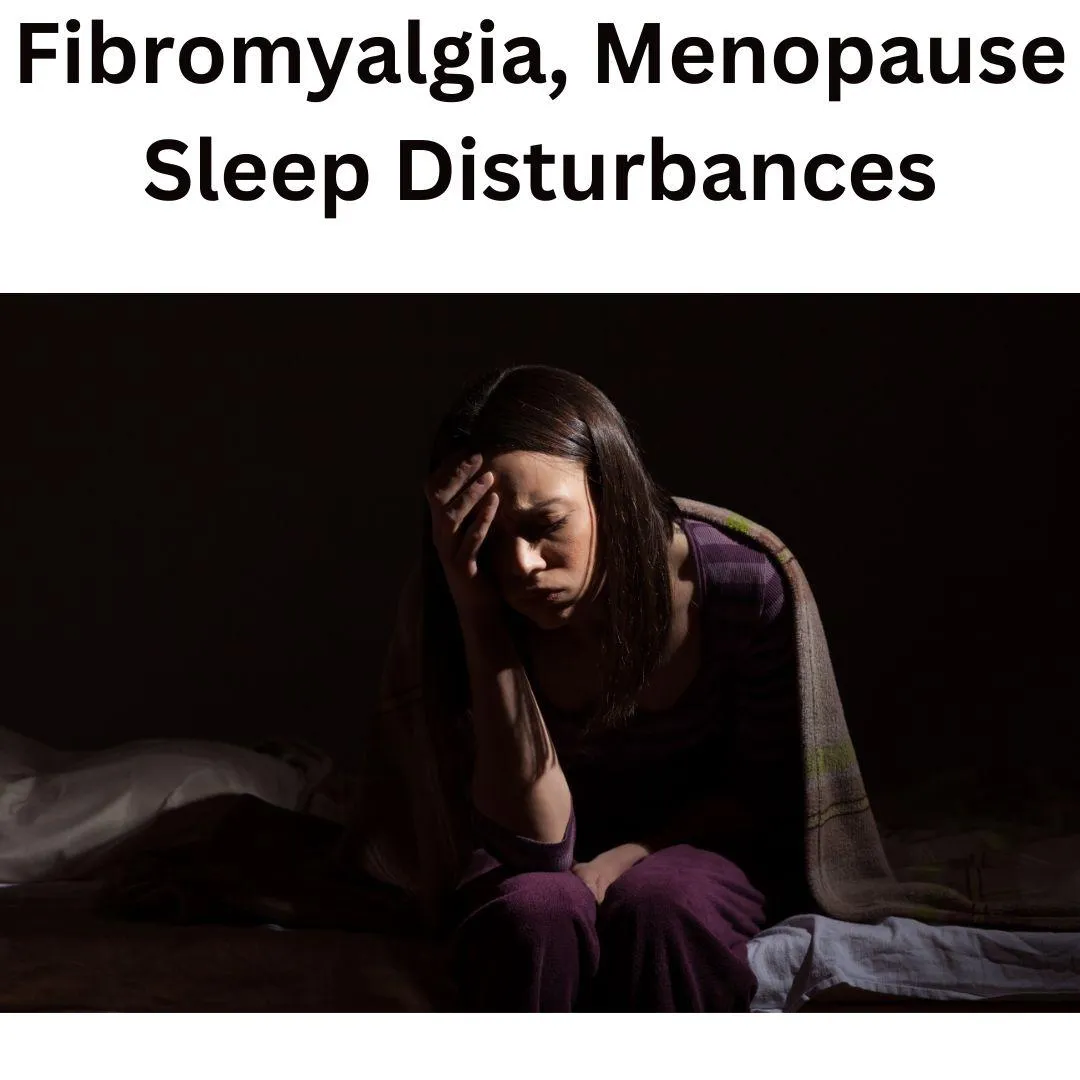*Open to Florida Residents
Blog
Blog

Fibromyalgia, Menopause and Sleep Disturbances
Fibromyalgia, Menopause and Sleep disturbances:
Sleep disorders can significantly impact women who experience both fibromyalgia and menopause. Fibromyalgia is a chronic condition characterized by widespread musculoskeletal pain, fatigue, and sleep disturbances. Women are disproportionately affected by Fibromyalgia (FM) with prevalence rates increasing around the time of menopause. The hormonal fluctuations experienced during menopause, particularly the decline in estrogen levels, can contribute to the worsening of fibromyalgia symptoms.
Menopause is a natural phase of life that brings about significant hormonal changes in Women’s bodies. The decline in estrogen levels, a hallmark of menopause, contributes to an array of symptoms, including hot flashes, night sweats and mood swings. Importantly, these hormonal fluctuations can significantly disrupt sleep patterns, leading to insomnia and fragmented rest. Sleep disturbances are common during menopause, affecting up to 60% of women.
For women living with fibromyalgia, the transition through menopause can exacerbate symptoms and lead to increased sleep disturbances. Poor sleep has been reported in almost 90% of subjects with Fibromyalgia. Recent research indicates a bidirectional relationship between sleep disturbances and fibromyalgia. Poor sleep quality not only exacerbates fibromyalgia symptoms but can also contribute to the development of fibromyalgia in susceptible individuals. Studies have demonstrated that deprivation of some stages of NREM (non-rapid eye movement) sleep can lead to painful musculoskeletal symptoms and intense muscular tenderness for fibromyalgia.
When fibromyalgia and menopause occur simultaneously, the combination can exacerbate symptoms and intensify the impact on sleep. The interplay between the two conditions can create a vicious cycle: poor sleep worsens fibromyalgia symptoms, while fibromyalgia symptoms such as pain and discomfort further disrupt sleep. The consequences of sleep disorders associated with fibromyalgia and menopause are far-reaching. Sleep deprivation and fragmented sleep impair cognitive function, memory, concentration, and overall quality of life. Fatigue and excessive daytime sleepiness can also impact mood, leading to irritability, depression, and anxiety.
There are several strategies for managing fibromyalgia and sleep disturbances during menopause:
First is Bio-identical Hormone Replacement therapy, (BHRT)which can help alleviate menopause symptoms including sleep disturbances. During menopause, the decline in estrogen and progesterone levels can disrupt the regulation of sleep-wake cycles and affect the quality of sleep BHRT involves using hormones that structurally identical to those naturally produced by the body, thereby aiming to restore hormonal balance and potentially improve sleep patterns.
Estrogen has a role in the regulation of sleep processes and can influence the duration and quality of sleep. Low levels of estrogen can lead to night sweats, hot flashes, and increased wakefulness during the night. BHRT can supplement estrogen levels, potentially reducing these symptoms and promoting better sleep.
Progesterone has sedative properties that can enhance sleep quality. BHRT with progesterone may help alleviate insomnia symptoms such as difficulty falling asleep or staying asleep.
BHRT allows for personalized treatment based on an individual's hormone levels and symptoms. This customization ensures that the therapy addresses the specific sleep concerns experienced during menopause with fibromyalgia.
The second strategy is sleep hygiene which is a set of practices and habits that promote good sleep quality and quantity. Here are some sleep hygiene tips that can help women experiencing menopause and fibromyalgia. First stick to a consistent sleep schedule, a regular sleep routine by going to bed and waking up at the same time even on weekends. This helps regulate your body’s internal clock and promotes better sleep quality. Create a sleep-friendly environment by making your bedroom conducive to sleep. Ensure the room is dark, quiet, and at a comfortable temperature. Use curtains, earplugs, or white noise machines to block unwanted noise or light. Next strategy is engaging in relaxation techniques before bedtime to help prepare your body and mind for sleep. This can include deep breathing exercises, progressive muscle relaxation, gentle stretching, or mindfulness meditation. These techniques can promote relaxation, reduce stress, and calm the mind.
Avoid stimulating substances, limit or avoid consumption of substances that can interfere with sleep, such as caffeine, nicotine, and alcohol. These substances can disrupt sleep patterns and contribute to sleep disturbances.
Engagement in regular physical activity has been shown to have multiple benefits for sleep, reducing symptoms of menopause and fibromyalgia. Aim for moderate-intensity aerobic exercise most days of the week. However, be cautious about exercising too close to bedtime, as it can cause alertness and difficulty falling asleep.
Establish a pre-sleep routine by engaging in activities that promote relaxation, such as reading a book, taking a warm bath, or listening to soothing music. Avoid electronic screens such as smartphones, tablets, and laptops, before bed, as the blue light emitted can interfere with the production of sleep-inducing hormones.
Remember, establishing and maintaining good sleep hygiene practices may take time and consistency. It is important to be patient and persistent while incorporating these habits into your daily routine.
Cognitive Behavioral Therapy and Hypnotherapy are both therapies for insomnia which can help address negative thought patterns and behaviors contributing to sleep disturbances.
Navigating fibromyalgia and sleep disturbances during menopause can be challenging, but with a multifaceted approach incorporating lifestyle modifications, medical interventions, and self-care practices it is possible to find relief and improve overall well-being.

Fibromyalgia, Menopause and Sleep Disturbances
Fibromyalgia, Menopause and Sleep disturbances:
Sleep disorders can significantly impact women who experience both fibromyalgia and menopause. Fibromyalgia is a chronic condition characterized by widespread musculoskeletal pain, fatigue, and sleep disturbances. Women are disproportionately affected by Fibromyalgia (FM) with prevalence rates increasing around the time of menopause. The hormonal fluctuations experienced during menopause, particularly the decline in estrogen levels, can contribute to the worsening of fibromyalgia symptoms.
Menopause is a natural phase of life that brings about significant hormonal changes in Women’s bodies. The decline in estrogen levels, a hallmark of menopause, contributes to an array of symptoms, including hot flashes, night sweats and mood swings. Importantly, these hormonal fluctuations can significantly disrupt sleep patterns, leading to insomnia and fragmented rest. Sleep disturbances are common during menopause, affecting up to 60% of women.
For women living with fibromyalgia, the transition through menopause can exacerbate symptoms and lead to increased sleep disturbances. Poor sleep has been reported in almost 90% of subjects with Fibromyalgia. Recent research indicates a bidirectional relationship between sleep disturbances and fibromyalgia. Poor sleep quality not only exacerbates fibromyalgia symptoms but can also contribute to the development of fibromyalgia in susceptible individuals. Studies have demonstrated that deprivation of some stages of NREM (non-rapid eye movement) sleep can lead to painful musculoskeletal symptoms and intense muscular tenderness for fibromyalgia.
When fibromyalgia and menopause occur simultaneously, the combination can exacerbate symptoms and intensify the impact on sleep. The interplay between the two conditions can create a vicious cycle: poor sleep worsens fibromyalgia symptoms, while fibromyalgia symptoms such as pain and discomfort further disrupt sleep. The consequences of sleep disorders associated with fibromyalgia and menopause are far-reaching. Sleep deprivation and fragmented sleep impair cognitive function, memory, concentration, and overall quality of life. Fatigue and excessive daytime sleepiness can also impact mood, leading to irritability, depression, and anxiety.
There are several strategies for managing fibromyalgia and sleep disturbances during menopause:
First is Bio-identical Hormone Replacement therapy, (BHRT)which can help alleviate menopause symptoms including sleep disturbances. During menopause, the decline in estrogen and progesterone levels can disrupt the regulation of sleep-wake cycles and affect the quality of sleep BHRT involves using hormones that structurally identical to those naturally produced by the body, thereby aiming to restore hormonal balance and potentially improve sleep patterns.
Estrogen has a role in the regulation of sleep processes and can influence the duration and quality of sleep. Low levels of estrogen can lead to night sweats, hot flashes, and increased wakefulness during the night. BHRT can supplement estrogen levels, potentially reducing these symptoms and promoting better sleep.
Progesterone has sedative properties that can enhance sleep quality. BHRT with progesterone may help alleviate insomnia symptoms such as difficulty falling asleep or staying asleep.
BHRT allows for personalized treatment based on an individual's hormone levels and symptoms. This customization ensures that the therapy addresses the specific sleep concerns experienced during menopause with fibromyalgia.
The second strategy is sleep hygiene which is a set of practices and habits that promote good sleep quality and quantity. Here are some sleep hygiene tips that can help women experiencing menopause and fibromyalgia. First stick to a consistent sleep schedule, a regular sleep routine by going to bed and waking up at the same time even on weekends. This helps regulate your body’s internal clock and promotes better sleep quality. Create a sleep-friendly environment by making your bedroom conducive to sleep. Ensure the room is dark, quiet, and at a comfortable temperature. Use curtains, earplugs, or white noise machines to block unwanted noise or light. Next strategy is engaging in relaxation techniques before bedtime to help prepare your body and mind for sleep. This can include deep breathing exercises, progressive muscle relaxation, gentle stretching, or mindfulness meditation. These techniques can promote relaxation, reduce stress, and calm the mind.
Avoid stimulating substances, limit or avoid consumption of substances that can interfere with sleep, such as caffeine, nicotine, and alcohol. These substances can disrupt sleep patterns and contribute to sleep disturbances.
Engagement in regular physical activity has been shown to have multiple benefits for sleep, reducing symptoms of menopause and fibromyalgia. Aim for moderate-intensity aerobic exercise most days of the week. However, be cautious about exercising too close to bedtime, as it can cause alertness and difficulty falling asleep.
Establish a pre-sleep routine by engaging in activities that promote relaxation, such as reading a book, taking a warm bath, or listening to soothing music. Avoid electronic screens such as smartphones, tablets, and laptops, before bed, as the blue light emitted can interfere with the production of sleep-inducing hormones.
Remember, establishing and maintaining good sleep hygiene practices may take time and consistency. It is important to be patient and persistent while incorporating these habits into your daily routine.
Cognitive Behavioral Therapy and Hypnotherapy are both therapies for insomnia which can help address negative thought patterns and behaviors contributing to sleep disturbances.
Navigating fibromyalgia and sleep disturbances during menopause can be challenging, but with a multifaceted approach incorporating lifestyle modifications, medical interventions, and self-care practices it is possible to find relief and improve overall well-being.
Let me help you achieve your goals.
Disclaimer: We understand that every individual's experience is unique and results may vary depending on various factors, such as attitude, adaptability, personal history, and overall health. For your safety and well-being, we highly recommend consulting your physician before beginning any program. At Elite Sexual Hormone Health, we do not diagnose, treat, or prescribe any medical or psychological disorders. We urge you to seek the care of a qualified physician or psychotherapist if you suffer from any psychological or medical disorder. Thank you for choosing Elite Sexual Hormone Health as your partner in your journey towards wellness.
© 2024, Elite Sexual Hormone Health. All rights reserved.
Privacy Policy | Terms of Service | Disclaimer
© 2024, Elite Sexual Hormone Health. All rights reserved.
Website by Hypnotherapy Accelerator





